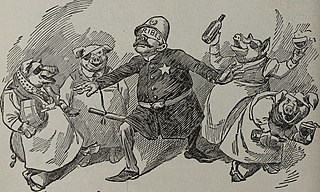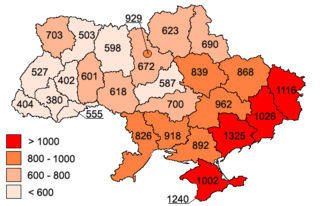
Crime in the Czech Republic is combated by the Czech Police and other agencies.

Crime in the Czech Republic is combated by the Czech Police and other agencies.
In 2012, the Czech Republic had a murder rate of 1.0 per 100,000 population. [1] There were a total of 105 murders in the Czech Republic in 2012. [1]
Political corruption (especially bribery) and theft are one of the most severe issues in the Czech Republic. [2] [3] [4] [5] [6] Group of States Against Corruption mainly criticises the lack of pro-active monitoring of the financing and states that an effective supervisory mechanism is missing. [4]
A survey of Transparency International in 2009 showed that fewer than 1 in 10 respondents find the anti-corruption efforts of their government effective. [7] In 2010, 44% of people answered that the corruption increased. [7] [8]
In January 2019 a 71-year-old Czech pensioner, Jaromir Balda, was jailed for four years for terrorism after he had cutd down trees to block railway lines in order to pretend Islamists were responsible. He had left messages at the scene saying "Allahu Akbar" ("God is great" in Arabic). [9]
At the age of 15, youths are considered to have diminished criminal responsibility and reach the age of full criminal responsibility at 18. In the 10 years prior to and including 2006, there were 4,000 projects, the majority aimed at juvenile crime, introduced to increase cooperation between citizens, municipal bodies, and the Czech police. The goal of these programs is to increase education, training, and crime prevention within the communities by providing youth with several leisure and sports activities. [10]
Boys are the victims of robbery four times that of girls but for both boys and girls, the risk of victimization of robbery decreases with grade level. [11]
Estonia is a relatively safe country, and the risk of being a victim of crime in Estonia is small by international standards. As in other post-Soviet states, crime has increased in the 1990s, but then it has gradually decreased in the 21st century.

Police corruption is a form of police misconduct in which law enforcement officers end up breaking their political contract and abusing their power for personal gain. This type of corruption may involve one or a group of officers. Internal police corruption is a challenge to public trust, cohesion of departmental policies, human rights and legal violations involving serious consequences. Police corruption can take many forms, such as: bribery, theft, sexual assault, and discrimination.

Corruption is a form of dishonesty or a criminal offense which is undertaken by a person or an organization which is entrusted in a position of authority, in order to acquire illicit benefits or abuse power for one's personal gain. Corruption may involve many activities which include bribery, influence peddling and embezzlement and it may also involve practices which are legal in many countries. Political corruption occurs when an office-holder or other governmental employee acts with an official capacity for personal gain. Corruption is most common in kleptocracies, oligarchies, narco-states, and mafia states.

Financial crime is crime committed against property, involving the unlawful conversion of the ownership of property to one's own personal use and benefit. Financial crimes may involve fraud ; theft; scams or confidence tricks; tax evasion; bribery; sedition; embezzlement; identity theft; money laundering; and forgery and counterfeiting, including the production of counterfeit money and consumer goods.

Crime rates in Portugal are generally low, and most crimes are non-violent. Portugal's security and peace indicators compare favourably to those of other countries; According to the Institute for Economics and Peace's 2022 Global Peace Index report, Portugal ranks as the 6th most peaceful country in the world.

Crime in Russia refers to the multivalent issues of organized crime, extensive political and police corruption, and all aspects of criminality at play in Russia. Violent crime in Siberia is much more apparent than in Western Russia.
Despite a reportedly low crime rate in China, crime still occurs in various forms. The Chinese government does not release exact unified statistics on crime rates and the rate of criminal offending due to such information being considered politically and socially sensitive. Scarce official statistics released are the subject of much academic debate due to allegations of statistical fabrication, under-reporting and corruption. The illegal drug trade in China is a significant driver of violent crime, including murder.

Crime in the Maldives ranks from low to moderate, but crime rates in the country have increased significantly in recent years. Incidents of theft on beaches or in hotels do occur. Juvenile delinquency is a growing problem in the Maldives. According to the data available from the Ministry of Defence and National Security, there has been an increase in petty crime in the country. In 1992, 169 cases of petty crime were reported, while the number was 462 in 1996. The number of sentenced persons under the age of 19 also increased from 391 in 1988 to 512 in 1998. Fraud examiner Peter Lilley in his book Dirty Dealing writes that money laundering is not a significant problem in the Maldives.

Slovakia is a Central European country with a history of relatively low crime. While crime became more widespread after the Revolutions of 1989, it remains low when compared to many other post-communist countries.

The fight against crime in Ukraine is led by the Ukrainian Police and certain other agencies. Due to the hard economic situation in the 1990s, the crime rate rose steadily to a peak in 2000. Following this peak, the crime rate declined, until 2009. In that year, the world financial crisis reached Ukraine.

Finland's overall corruption is relatively low, according to public opinion and global indexes and standards. The 2023 Corruption Perceptions Index released by Transparency International scored Finland at 87 on a scale from 0 to 100. When ranked by score, Finland ranked second among the 180 countries in the Index, where the country or countries ranked first are perceived to have the most honest public sector. Finland has ranked first, second or third every year since the current version of the Index was introduced in 2012. For comparison with 2023 worldwide scores, the best score was 90, the average score was 43, and the worst score was 11. For comparison with regional scores, the highest score among Western European and European Union countries was 90, the average score was 65 and the lowest score was 42.

Corruption in Italy is a major problem. In Transparency International's annual surveys, Italy has consistently been regarded as one of the most corrupt countries in the Eurozone. Political corruption remains a major problem particularly in Lombardy, Campania and Sicily where corruption perception is at a high level. Political parties are ranked the most corrupt institution in Italy, closely followed by public officials and Parliament, according to Transparency International. But in the 2013 Global Corruption Barometer report, Italy is in 17th position in front of the United Kingdom (18th), Switzerland (21st) and the United States (22nd).

Corruption in France describes the prevention and occurrence of corruption in France.

Corruption in Lithuania describes the prevention and occurrence of corruption in Lithuania.

Corruption in Denmark is amongst the lowest in the world.

Corruption in the Czech Republic is considered to be widespread by a majority of the Czech public, according to Transparency International’s Global Corruption Barometer 2013.

Corruption in Slovenia is examined on this page.
Anti-corruption comprises activities that oppose or inhibit corruption. Just as corruption takes many forms, anti-corruption efforts vary in scope and in strategy. A general distinction between preventive and reactive measures is sometimes drawn. In such framework, investigative authorities and their attempts to unveil corrupt practices would be considered reactive, while education on the negative impact of corruption, or firm-internal compliance programs are classified as the former.

Transparency International defines corruption as "the abuse of entrusted power for private gain". Transparency International's 2023 Corruption Perceptions Index scored the United Kingdom at 71 on a scale from 0 to 100. When ranked by score, the United Kingdom ranked 20th among the 180 countries in the Index, where the country ranked first is perceived to have the most honest public sector. For comparison with worldwide scores, the best score was 90, the average score was 43, and the worst score was 11. For comparison with regional scores, the highest score among Western European and European Union countries was 90, the average score was 65 and the lowest score was 42. The United Kingdom's score has fallen six points over the last five years and is now at its lowest point in the twelve years that the current version of the Index has been published.

Crime in Latvia is relatively low, by global standards, especially compared to previous years, when it was named the "crime capital of Europe" by Forbes in 2008. The homicide rate in Latvia was 4.9 per 100,000 people in 2020, a sharp drop from 10 cases per 100,000 people in 2000, and has been steadily decreasing, but has seen recent increases. The United States Department of State has assessed Latvia's security rating as "medium", with a moderate crime rate. In recent times, crime has been increasing, particularly due to many Latvians stranded because of the COVID-19 pandemic returning to Latvia and choosing to commit crime. According to Interpol, Latvia is considered an attractive place for regional and organized criminals involved in drug trafficking, arms trafficking, human trafficking, or smuggling. According to the Central Statistical Bureau of Latvia, a third of all women in Latvia have suffered some form of sexual violence or rape while men are subjected to violence outside the family.